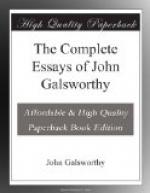Of these three possible reasons for our dislike of things as they are, the first two are perhaps contained within the third. But, to whatever our dislike is due, we have it—Oh! we have it! With the possible exception of Hogarth in his non-preaching pictures, and Constable in his sketches of the sky,—I speak of dead men only,—have we produced any painter of reality like Manet or Millet, any writer like Flaubert or Maupassant, like Turgenev, or Tchekov. We are, I think, too deeply civilised, so deeply civilised that we have come to look on Nature as indecent. The acts and emotions of life undraped with ethics seem to us anathema. It has long been, and still is, the fashion among the intellectuals of the Continent to regard us as barbarians in most aesthetic matters. Ah! If they only knew how infinitely barbarous they seem to us in their naive contempt of our barbarism, and in what we regard as their infantine concern with things as they are. How far have we not gone past all that—we of the oldest settled Western country, who have so veneered our lives that we no longer know of what wood they are made! Whom generations have so soaked with the preserve “good form” that we are impervious to the claims and clamour of that ill-bred creature—life! Who think it either dreadful, or ‘vieux jeu’, that such things as the crude emotions and the raw struggles of Fate should be even mentioned, much less presented in terms of art! For whom an artist is ‘suspect’ if he is not, in his work, a sportsman and a gentleman? Who shake a solemn head over writers who will treat of sex; and, with the remark: “Worst of it is, there’s so much truth in those fellows!” close the book.




